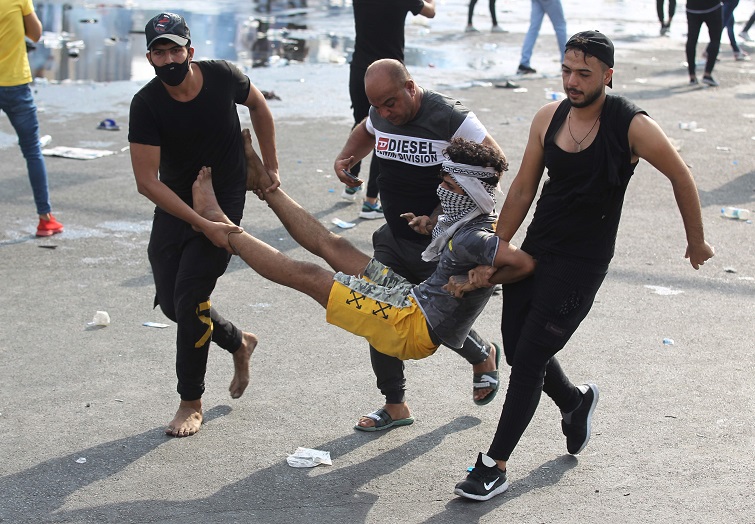
Men carry away a protester injured during clashes with riot police during a demonstration against state corruption and poor services, between the Iraqi capital Baghdad's Tahrir Square and the high-security Green Zone district, October 1, 2019. Photo: Ahmad al-Rubaye / AFP
ERBIL, Kurdistan Region – Hundreds of Iraqis took to the streets of Baghdad on Tuesday to protest the lack of basic services, rampant corruption, and unequal treatment within the Iraqi Army.
Riot police used water cannons, tear gas, rubber bullets, and live ammunition to disperse the crowd of mostly young men, who covered their faces with scarves and flags.
According to Iraq's health ministry, one person has been killed and at least 200 wounded, including 40 members of the security forces, AFP reports.
Speaking to Rudaw, Zaid al-Qaisy, a press spokesman for the Iraqi interior ministry, confirmed there had been at least one fatality and dozens of injuries in Tuesday's protest.
However, medics at Sheikh Zaid Hospital who spoke to Rudaw put the figure at three dead.
Abdulhussein al-Jaberi, the health chief for Dhi Qar province, told AFP another person had been killed in similar protests in the southern province.
Firebrand Shiite cleric and Sayirun alliance chief Muqtada al-Sadr tweeted on Tuesday evening calling on the president, prime minister, and speaker of the parliament to launch an inquiry into what happened.
Besides economic grievances, protesters are also outraged at the Friday dismissal of Iraqi Army commander Lt. Gen. Abdul Wahab al-Saadi, credited with the defeat of the Islamic State (ISIS) in Iraq, from the Iraqi Counter-Terrorism Services (ICTS).
“We don’t want this is corrupt government,” protesters chanted. “All are corrupt equally.”
Among the protesters Rudaw met a unit of the Popular Mobilization Forces (PMF), known in Arabic as Hashd al-Shaabi. Unlike other factions of the PMF which operate independently of the government, theirs was under the command of the Iraqi Ministry of Defense (MoD).
The faction complained of “marginalization” within the security apparatus, saying they do not get paid a government salary like their Iraqi Army counterparts and lack sufficient logistical support.
“For how long will the state turn its back on them [MoD PMF]?” one demanded.
Tahrir Square has long been the site of popular protest.
“We are protesters of Tahrir Square… We have been in Tahrir since 2010, demanding the rights of the deprived people. Why have they put the implementation of the constitution’s sections on hold? There are no laws. The country is in chaos,” one woman told Rudaw.
“We are done with demanding. We are here to take our rights in any possible way, but we are civilized peaceful protesters… We aren’t rioters. We demand rights.”
Women have become beggars on the street and children don’t have access to schools, she added, claiming they are leading a “revolution”.
“There is no public employment. We are tired of the state. Nothing works. There is no paving, no electricity,” another protester added.
Iraqi graduates have also been protesting since June over the lack of jobs in Iraq’s already bloated public sector. Water cannons were used to quell protests last Wednesday.

Iraq’s second city of Basra also saw protests on Tuesday, according to the city’s Tribal Council secretary general Sheikh Raid al-Firieji. Security forces responded with “excessive force” and arrested protestors, he told Rudaw.
In the summer of 2018, protests over unemployment and inadequate water and electricity supply in Basra soon spread across the country. They were met with violent state suppression, killing at least 14 protesters.
A member of Iraqi parliament’s biggest political bloc warned Monday against the politicization of the protests by opportunists.
“We warn against the politicization of protests or its deviation from its legitimate goals and demands,” Rami al-Sikeini, a Sayirun Alliance MP from Basra, told Rudaw.
Last year’s protests dashed the hopes of former Iraqi prime minister Haider al-Abadi of gaining a second term in office.
Current Prime Minister Adil Abdul-Mahdi was elected as an independent candidate who does not belong to a particular parliamentary bloc, making him vulnerable to pressure from both the public and parliamentary forces.









Comments
Rudaw moderates all comments submitted on our website. We welcome comments which are relevant to the article and encourage further discussion about the issues that matter to you. We also welcome constructive criticism about Rudaw.
To be approved for publication, however, your comments must meet our community guidelines.
We will not tolerate the following: profanity, threats, personal attacks, vulgarity, abuse (such as sexism, racism, homophobia or xenophobia), or commercial or personal promotion.
Comments that do not meet our guidelines will be rejected. Comments are not edited – they are either approved or rejected.
Post a comment